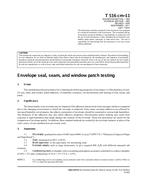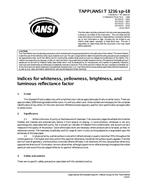Click here to purchase
This method describes the procedure for determining the “available chlorine” of bleaching powder, calcium hypochlorite bleach liquor, and bleach sludge. In addition, the procedures for deter-mining total chlorine and titratable alkali are described. In these procedures the available chlorine, as determined, includes any chlorite that may be present.Available chlorine is determined by adding a measured amount of sample solution to an acidified solution of potassium iodide, liberating an equivalent amount of iodine. This free iodine is determined by titration with standardized sodium thiosulfate solu-tion, using a starch indicator endpoint.Total chlorine is determined titrimetrically by the Mohr method, employing standardized neutral silver nitrate solution. The determination involves treatment of a measured amount of sample solution with an excess of dilute (3%) hydrogen peroxide to reduce hypochlorites to chloride. The deter-mination includes chloride formed during manufacture of the bleach as well as that formed through the reduction treat-ment. Potassium chromate is employed asindicator in the titration.Titratable alkali is determined in a measured amount of the sample solution with standardized hydrochloric acid solution. Bleaching properties of the sample are discharged by the addition of small amounts of hydrogen peroxide (3%). Methyl orange/xylene cyanole indicator is used as the endpoint detector.
Product Details
- Published:
- 01/01/2007
- Number of Pages:
- 7
- File Size:
- 1 file , 56 KB


